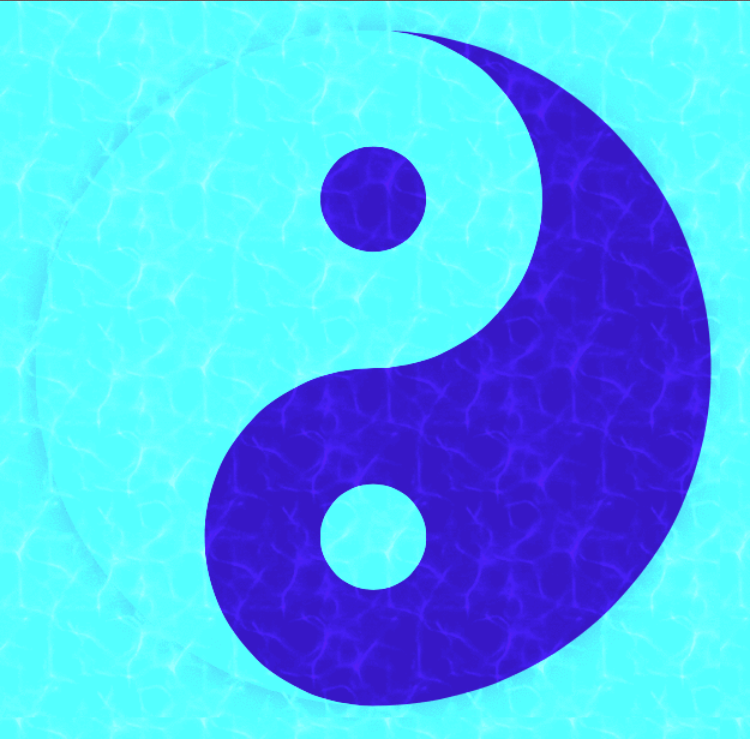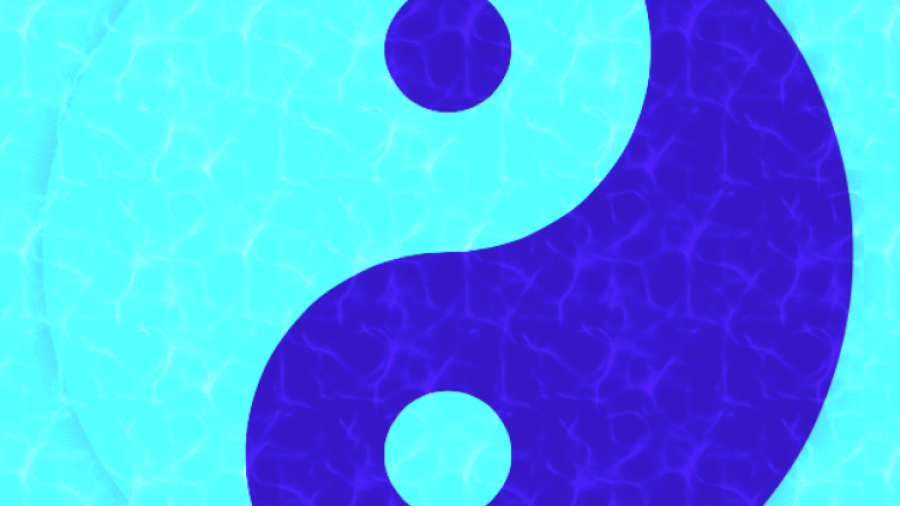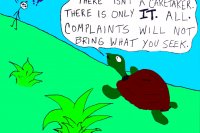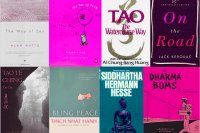“Flow with whatever may happen, and let your mind be free: Stay centered by accepting whatever you are doing. This is the ultimate.”
― Chuang Tzu
A sizable number of humans who hear the phrase, “go with the flow,” probably barely register it or associate it with some reductive hippie philosophy of yesteryear—a philosophy of laziness and complacency that overlooks the complexities and difficulties of day-to-day life.
But I’m here today to stand up for those four words, bro! Because, well, in my experience, they’re actually, like, a spectacularly concise formulation of what I consider to be potent, evergreen, life-reupholstering wisdom. To understand why, we have to take a bit of a detour.

The well-known Taoist symbol of the yin and yang represents the interdependence of all things. Source: Public Domain
The Taoism Tangent
Fittingly, it’s been too long since I’ve gone on a nice Taoism tangent on this web-haven, so, hell yes, let’s talk about Taoism¹. To give you a brief refresher course, Taoists are all about that “Tao,” which translates literally to mean “way,” or “the Way.”
The Tao is essentially the one and only path of all things, the spontaneous way in which existence unfolds. “Tao” is mostly another term for “nature’s course,” but infused with a kind of ineffable, sacred dimension. It’s basically a really cool term for the primordial, fundamental, flowing energy of existence—the basic quantum jive-juice, the ever-unfurling cosmic tapestry, the interpenetrating river of being that flows through you and me and every germ, pelican, cloud, quasar, landfill, and petunia. “The Tao is that from which nothing can depart,” as some have said.
The irony is that you can never really define “Tao” because “the Tao that can be told is not the eternal Tao,” as the Chinese philosopher and OG of Taoism, Lao Tzu, once observed. This dude recognized that words are mere representations of things—symbols that conjure different concepts in the subjective minds of different individuals. Lao Tzu wanted to be sure that people recognized that the word is not the thing itself, that every human would have a different conception of “Tao,” and that no person’s conception could ever equate with the true Way.
In truth, it goes deeper than that. Taoist sages have held that it is in the very act of naming things that we create a world of separate objects. The moment we call that brown and green nature-claw a “tree” is the moment we produce a false belief—i.e. the belief that “tree” is something independent, something separate from the soil, the planet, the entirety of existence. In truth, if we could forget words, we would see that a universe of separate objects is really a necessary illusion that our minds create to navigate the material world. On the deepest level, there is but one process, one unfolding existence, one Tao. This is why the great Chinese philosopher Chuang Tzu (if Lao Tzu is the Batman of Taoism, Chuang Tzu is Robin) once observed:
“The fish trap exists because of the fish. Once you’ve gotten the fish you can forget the trap. The rabbit snare exists because of the rabbit. Once you’ve gotten the rabbit, you can forget the snare. Words exist because of meaning. Once you’ve gotten the meaning, you can forget the words. Where can I find a man who has forgotten words so I can talk with him?”
Language is of course perennially necessary for the functioning of our complex societies, not to mention a beautiful/useful human-thing in its own right, but Taoists urge us to see beyond words, to perceive and contemplate the nameless, the inexpressible, that which words cannot characterize and are likely to muddle. The famous Austrian-British philosopher Ludwig Wittgenstein pointed to this same domain of the inexpressible when he wrote, “Whereof one cannot speak, thereof one must be silent.”
So, in sum, the Tao is the inscrutable, indescribable stream of existence, ever-faithfully bearing us from point to point, ever-flawlessly containing the sacred, immutable tension between the yin and yang—symbols representing the polarity and interdependence that Taoists perceive to be inherent in all things. There is, of course, more to Taoism than what I’ve mentioned here, but for our purposes, this will suffice.
Flow With the Go
So congratulations, you’ve passed Taoism 101. Have a yin-and-yang-themed cookie. Now it’s time to consider how the Taoists felt we should live, given our knowledge—not a conceptual understanding, more of a spiritual-intuitive-mystical knowledge—of the Tao. To employ contemporary parlance, they mostly said we should all chill the hell out, give way fewer fucks, do our thing, have compassion, and groove with whatever’s going on. “Embrace what you are and whatever is happening to you” is a pretty apt summation of the practical side of Taoist philosophy. Or, said another way, “go with the flow.”²
Since the ancient genesis of Taoism, Taoist poets and philosophers have employed metaphors to characterize the Tao, and the most popular and seemingly effective metaphor is: Tao = water. Think about it for a moment. Without any thought or effort, water has an ineffable way of always doing precisely what is appropriate. It simply does its water-thing, flowing when it’s time to flow, stagnating when it’s time to be still, changing shape to fit its every container perfectly. Without striving or setting goals for itself or worrying about anything, water manages to sustain all life on Earth, to rise to the heavens and to fall back to the soil, to carve valleys and canyons out of solid stone. Water does all of this not by wielding some kind of superpower, but by being nothing more and nothing less than itself. Bruce Lee, the renowned martial artist, was heavily influenced by Taoism and once wrote:
“You must be shapeless, formless, like water. When you pour water in a cup, it becomes the cup. When you pour water in a bottle, it becomes the bottle. When you pour water in a teapot, it becomes the teapot. Water can drip and it can crash. Become like water my friend.”
The effortlessness with which water accomplishes its every feat is essential to note. Effortlessness, or non-action, is a key Taoist concept, known in Chinese as wu wei. Lao Tzu referred to this concept in the Tao Te Ching, the principle text of Taoist philosophy, when he wrote:
“The truly good man does nothing,
Yet nothing is left undone.”
This idea might be difficult to wrap your mind around, especially since you’re likely approaching it from a Western point of view. In the West, we tend to prize hard work and to worship those individuals who exert Herculean efforts to do things that ordinary people could not hope to do. We tend to think that if someone is “failing” to do something, then they ought to “try harder.” We furrow our brows, grit our teeth, and neurotically and incessantly ask ourselves what tasks we can tackle to further our life’s pursuits, to reach our “goals.”
Taoist sages kind of just don’t do any of that. Rather, they aspire to be like the Tao. Remember, the Tao is like water because it simply does. It simply flows. It is never right or wrong, good or evil, successful or failing; it simply is. Just as a river doesn’t have to try to be a river or think about how to do its river-thing, the Tao—existence itself—just happens, and yet “nothing is left undone.” It just is how it is, and how it is results in supernovas and waterfalls, dreams and love, black holes and rainforests, poetry and elephants. Pretty magnificent, bruh bruh.
And so Taoists of the ages have been like, “Well, shit we are the Tao, too, right? The Tao is everything and in everything. So maybe if we just stop striving, stop over-exerting, stop seeking, and stop worrying, things will just naturally arise in their own splendid way. And maybe while we’re at it we should have compassion for all sentient beings because really we’re all Tao and the Tao indiscriminately nourishes.” And then they just sat around for the rest of their lives doing absolutely nothing, THE END. Nah, jk.
Problems
It might seem at first that if one takes Taoist precepts to heart, one could easily become a perpetually couch-ridden non-entity. I suppose it’s possible, but probably unlikely. My take is that if one can step back and let go of excessive striving, concrete goals, and expectations for the future, all that will remain is one’s organic self, purely aligned³ with the Tao, existing in the moment, accepting life as it comes and blossoming in whatever way it wishes to blossom—“going with the flow,” in other words. And I think that for most people, going with the flow would probably mean doing all sorts of stuff, though perhaps more so for intrinsic delight and enrichment than as a means to some external end.
It might also seem that Taoist philosophy is ultimately one of unconsciousness—i.e. one which suggests we shouldn’t even think about what’s happening and just act on impulse. I don’t think so, and neither did British philosopher Alan Watts. Watts thought Taoism and Zen encouraged us to flow intelligently with our nature. We can simply be what we are, but that doesn’t preclude us from being conscious. I would argue that an important aspect of “going with the flow” involves possessing a deep understanding of ourselves—our core values and identity—and allowing that understanding to meld seamlessly with our naked whims to result in a free-flowing self that is both spontaneous and aware/intelligent.
El Fin
Since first delving into Taoist philosophy a couple years ago and finding it inexplicably nourishing, I’ve done what I can to surrender to the way of things, to just roll with what is happening inside and out, to flow intelligently with my nature, to let my deep-down self express itself freely and organically in the world, to “go with the flow” and “do my thing.” Sometimes I have failed miserably, but on the whole, I’ve found that this way of being has resulted in my becoming a more contented person with greater equanimity who is able more so than before to experience the completeness of the moment and to enjoy whatever it is that I’m doing. And, perhaps surprisingly, I’ve done quite a lot—graduated university, taught English for a year in South Korea, read an array of marvelous books, traveled to 10 Asian countries, written a couple books’ worth of words, re-discovered drawing, and made a bunch of weird rap music—simply by doing what comes naturally.
This philosophy probably isn’t for everyone, especially if you’ve passed a significant amount of time living by the precepts of goal-setting and hard-working, but as Robert Plant once sang, “There’s still time to change the road you’re on.” Give this essay some thought, and maybe you’ll opt to look further into the wisdom of Taoism. If you’re curious enough, I think you’ll find that there are ways of resetting your default mode of being. Alan Watts’ books, Tao: The Watercourse Way and The Way of Zen, might aid you in your quest as well. Whatever the case, maybe we can all agree to go forth and “take it all a little less seriously,” “not sweat the small stuff,” etc. You know, just go with the flow, man. Or whatever, do whatever.
“Happiness is the absence of the striving for happiness.”
― Chuang Tzu
Footnotes
1. I.e. the philosophical tradition of Taoism, not the organized religion.
2. It should be noted that “go with the flow” could be interpreted via numerous lenses other than Taoist philosophy. This essay is not tracing the etymology of the phrase, per se, but rather offering one interpretation that seems useful/meaningful to the author. However, a cursory Google search reveals that the phrase may in fact have originated in the 60s counterculture, which was largely propelled by a resurgence of Eastern mysticism (Buddhism, Taoism, etc.). Still, the phrase can also mean “to side with the majority,” which is decidedly not the meaning being explored here.
3. If you were paying attention, here you might have asked yourself, “Well, wait, you said the Tao is that from which nothing can deviate, so aren’t all the try-hards and over-exerters therefore just as aligned with the Tao as the non-strivers?” On some level, yes, that would seem to be the case, but it appears to be something of a paradox. We are all fundamentally inseparable from nature (Tao), but there are some who seem fully to realize this communion in the depths of their beings, to live it by electing to become precisely what they are and nothing more, and to discover a profound sense of liberation in the process.
About Jordan Bates
Jordan Bates is a Lover of God, healer, mentor of leaders, writer, and music maker. The best way to keep up with his work is to join nearly 7,000 people who read his Substack newsletter.





Language is like the tao that flows (ie it is an evolving organismic thing/process), so the overcoming of words represents the necessary progression in language capable of representing itself in accord with the Tao. There is also the distinction between straight-up Primordiality (tejasa), aka the Great Ultimate/Void (taiji), from which yin & yang spring, and the consequent 10,000 things whose organizational progression constitutes all terms of Tao-ness (any expression in accord with said Tao), and the Dao/Tao proper (evolving Dao). Also, re note 1; philosophy is religion (distinguished from church-like social religion, which is external/ritualistic, though philosophy has its rituals… Read more »
thanks, nick. and thanks for the interesting note on philosophy being religion and vice versa. i don’t really make hard-and-fast distinctions in my mind between those two things, but there’s such a stigma/negative connotation around organized religion for many freethinkers that it seems easier to claim i’m thinking in a totally separate domain.
Over the past few weeks, I listened to the 14-hour Alan Watts CD series “Out of Your Mind.” He talks a lot about Taoism and other Eastern ideas, and a lot of it resonated with me. After reading this, I went and read a lot of your other articles about Taoism. Now you’ve got me hooked! Just ordered the Tao Te Ching, excited to read it.
🙂 that’s great, nick. thanks for continuing to allow lil’ ol’ me to influence the direction of your thought-space. ^^
My I suggest that “going with the flow” implies the effort of “going” … and that you actually are “flowing with the flow.” We place so many artificial deadlines on ourselves … “Gotta mow the lawn today, stuff comes up and AHHHHHH can’t ‘get to’ mowing the lawn, STRESS BOMB!” When in fact, we simply must “be” in the present moment, and let the moments do the work of guiding us. Where is your artificially created deadline once the deadline has passed? Of course, our culture doesn’t help much. But Tao is a very important way of allowing life to… Read more »
wonderful comment, joseph. thank you. 🙂
DFW actually comments on the hidden power of seemingly banal platitudes in Infinite Jest, unless I’m mistaken. But yeah, many of these seemingly too-simple-to-be-worthwhile sayings are sound life advice, but ‘go with the flow’ might have been one of those taken the least seriously by the many.
Ragnar, i think he talks about them in his ‘This is Water’ speech. he may in IJ also, i have yet to make it through that monster (though i hope to). i agree that it’s really easy to overlook cliches/platitudes or for them to be repeated so often that they lose their meaning, but some of them, if you happen to see them anew in a flash of insight, are really quite profound. after all, there’s a reason they became cliches — powerful, share-worthy memes. 🙂
No matter how much I enjoy an article/post/etc I never leave comments on websites, literally this is my first time. I really enjoy your style of writing and that just the few articles on website I’ve read so far has given me a lot of inspiration. I signed up for the mailing list, too.
Anyways my favorite line in this article: “going with the flow” involves possessing a deep understanding of ourselves—our core values and identity”. I even copied and pasted into Evernote so it doesn’t get lost.
Thanks Jordan.
The concept of going with the flow is similar to Sufi concept of Ridha bil Qadar (Happiness with God’s appointed destiny) which a Muslim scholar describes as following: {“It’s Ridha bil Qadar It’s being pleased with what Allah subhanahu wata’ala has decreed for you. That is true happiness and people are wretched in the world because they reject their circumstances. It doesn’t mean they can’t change their circumstances. But they are sad about the past. You can’t change the past. So to lose your happiness over what has happened in the past is actually not using the intellect correctly. The… Read more »